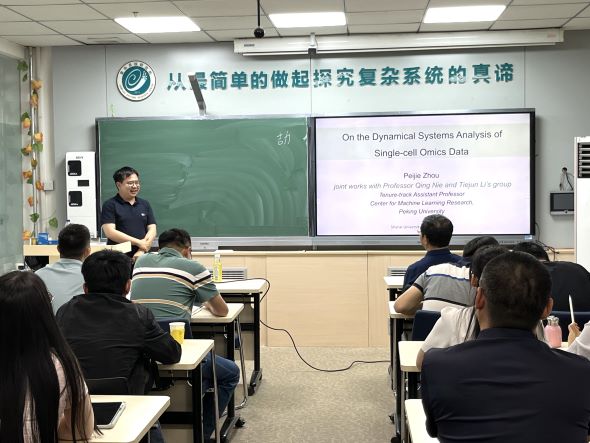报告题目:The dynamical system analysis of single-cell omics data
报告专家:周沛劼 研究员
报告时间:2024年5月13日 16:40-18:00
报告地点:复杂系统研究所4层报告厅(商学楼409室)
专家介绍:
周沛劼,北京大学前沿交叉学科研究院国际机器学习研究中心研究员,博士生导师,国家级青年人才。研究领域为计算系统生物学,主要科研兴趣为数据驱动的动力学建模与计算,研究成果发表在Nature Methods, Nature Genetics, Nature Machine Intelligence, Nature Communications, Physical Review X, Molecular Systems Biology, Nucleic Acids Research, Briefings in Bioinformatics等应用数学、数据科学和计算系统生物学的交叉学科期刊。曾于2019年获得北京大学优秀博士论文奖。
报告摘要:
Single-cell sequencing technologies provide unprecedented resolution for studying the dynamic process of cell-state transitions during development and complex disease. However, analyzing high-dimensional, static single-cell RNA-sequencing (scRNA-seq) data with dynamical systems models can be challenging due to the curse of dimensionality. In this talk, I will discuss how machine learning has enabled us to overcome this challenge and use dynamical systems techniques to analyze scRNA-seq data. I will introduce the low-dimensional dynamical manifold to identify attractor basins and transition probabilities in snapshot data. I will also present the usage of non-equilibrium dynamical systems theory to analyze attractor stability and identify transition-driving genes in gene expression and splicing processes. Finally, I will discuss our efforts to construct a time-varying landscape, which interpolates non-stationary time-series scRNA-seq data using Wasserstein-Fisher-Rao metric, unbalanced optimal transport and its neural network-based partial differential equation implementations. Overall, these approaches contribute to bridge the model-based and data-driven methods in the rationale analysis of single-cell biology.

周沛劼研究员在做精彩报告


